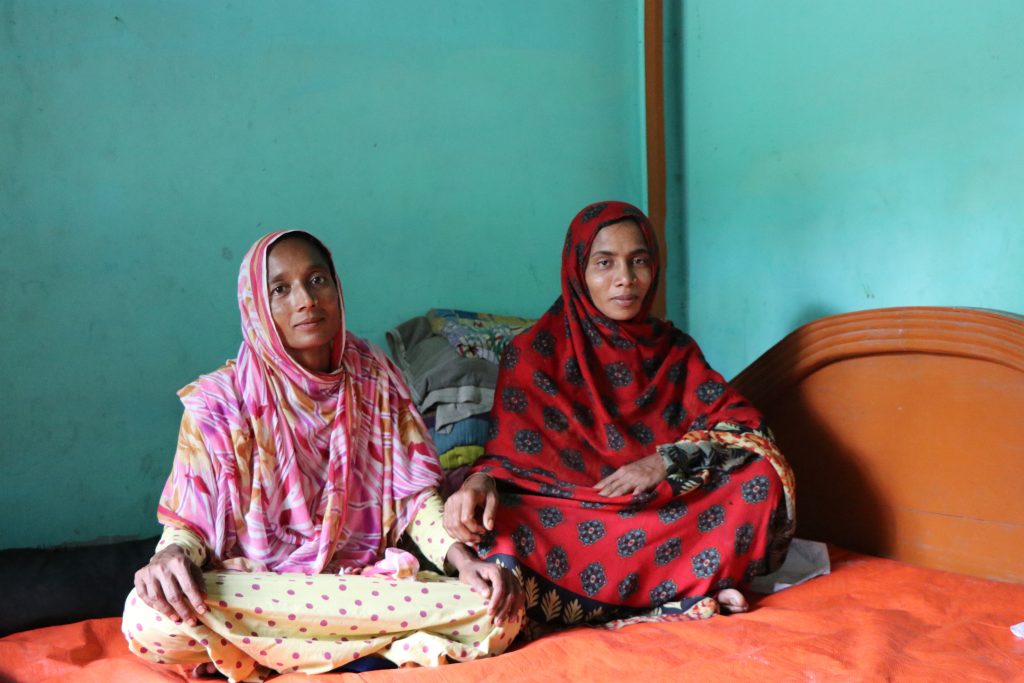
Mossammat Amena Khatun’s daily routine is like most women’s in the South Dalchara village of southwestern Bangladesh. She eats breakfast with her husband and sends her children to school. But two years ago, her husband fell from a tree and fractured his spine, leaving him unable to walk. Now, Amena and her son cultivate their land together with the help of hired laborers.
“His father is in bed; that is why my son has to do this toil,” Amena said. “He needs to work and obtain the means for studying.”
Before her husband’s accident, Amena started growing her own sunflower crop to earn additional income for her family. Sunflower is less labor intensive and requires fewer inputs than many crops, which means its cultivation is safer for female Bangladeshi farmers. Married women especially cannot easily hire male laborers and leave their village to buy inputs from male retailers or sell their crops to male traders without invoking disapproval.
In the coastal district where Amena lives, high soil salinity during the dry season makes growing certain crops impossible and food security a concern. Land often lies fallow for half the year. Sunflower not only grows in these conditions, but also provides both a cash crop and extra calories in the form of cooking oil, both of which are difficult to obtain in saline-prone coastal Bangladesh. More calories also help prevent stunting among children.
At first, Amena grew small amounts of sunflower. Because development organizations first introduced sunflower to the region following Cyclone Sidr in 2007, many farmers lack knowledge of proper cultivation techniques, and few buyers exist in the area. Without a profitable end market, farmers have had little incentive to invest in sunflower seeds, and seed companies have been reluctant to expand their sales volume.

Amena (left) with a friend and neighbor, Helena, who also grows sunflower and participates in farmer group trainings attended mostly by men.
Meanwhile, sunflower’s popularity is growing in urban markets. Since 2016, the price of sunflower grain has nearly doubled from BDT 25 to 43 (US$0.30 to US$0.51) per kilogram. Then came Northern Consumer Products Limited (NCPL), a Bangladeshi company with an oil processing mill keen on entering a burgeoning market.
The Feed the Future Bangladesh Rice and Diversified Crops (RDC) Activity, implemented by ACDI/VOCA and funded by USAID, signed an agreement with NCPL and linked the company with 753 sunflower farmers, including 216 women like Amena, in the region. NCPL agreed to advise these farmers on cultivation techniques and provide them with a 5 percent discount on seeds if they sold their crop to NCPL at the going market price at harvest time.
“We learned how many days before starting cultivation we will have to apply [fertilizer], how to space the seeds, what we need to do after the seeds germinate, what we need to do after the sunflower heads form, whether there is a pest attack … That’s why, this year, we have done sunflower in a big way and benefited from it,” Amena said.
With NCPL’s support, this year, Amena increased her sunflower production from 15 to 36 decimals of land. “I got good advice, good seeds,” she said. “So, I decided to see how it goes.”
Before, Amena would keep most or all of what she grew to use as cooking oil at home. By doubling her crop this year, she could sell half of it — about 140 kilograms for BDT 6,500 (US$153) — and keep the rest for her family.
NCPL’s model made it easier for female farmers like Amena to participate because farmer groups worked together to buy seeds and inputs, further preventing the need for women to travel outside the village.
In the past, Amena had to pay to transport her sunflower to a market to sell it. Now, NCPL purchases it directly from her home. The profits go to Amena, not just her husband.
Amena’s family no longer needs to buy cooking oil, rice, or food to get by. Instead, she pays for her son’s education. “By the grace of God, this is the result of my hard work,” she said. Amena herself did not complete secondary school. “In our villages, the girls are married off early. My dad married me off early. That’s why I couldn’t read further,” she said.
While both her son and daughter, six, attend school, her son receives private tutoring for BDT 1,800 (US$21) a month, which she hopes to also provide for her daughter someday. “My son is meritorious. He gets good points at examinations,” she said.
Amena plans to continue growing sunflower, as long as NCPL and its future competitors offer a good market price.
“We have profited from sunflower. We are quite happy,” she said.







